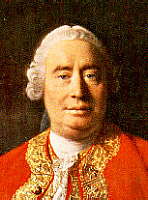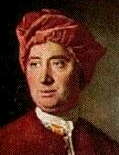37 David Hume

- Soon after completing his studies at Edinburgh, Scottish philosopher David Hume began writing his comprehensive statement of the views he believed would contribute to philosophy no less than Newton’s had to science. But the public reception for the three books of his magisterial Treatise of Human Nature (1739) was less than cordial, and Hume abandoned his hopes of a philosophical career in order to support his family as a librarian, historian, diplomat, and political essayist, a course of action he described in the autobiographical My Own Life (1776). Hume’s Essays Moral and Political(1741-1742) found some success, and the multi-volume History of England (1754-1762) finally secured the modest livelihood for which he had hoped. Although he spent most of his life trying to produce more effective statements of his philosophical views, he did not live to see the firm establishment of his reputation by the criticisms of Kant and much later appreciation of the logical positivists.
The central themes of Book I of the Treatise receive a somewhat more accessible treatment in An Enquiry concerning Human Understanding (1748), a more popular summary of Hume’s empiricism.
 According to Hume, little human knowledge can be derived from the deductively certain relations of ideas. Since the causal interactions of physical objects are known to us only as inherently uncertain matters of fact, Hume argued, our belief that they exhibit anynecessary connection (however explicable) can never be rationally justified, but must be acknowledged to rest only upon our acquired habits. In similar fashion, Hume argued that we cannot justify our natural beliefs in the reality of the self or the existence of anexternal world.
According to Hume, little human knowledge can be derived from the deductively certain relations of ideas. Since the causal interactions of physical objects are known to us only as inherently uncertain matters of fact, Hume argued, our belief that they exhibit anynecessary connection (however explicable) can never be rationally justified, but must be acknowledged to rest only upon our acquired habits. In similar fashion, Hume argued that we cannot justify our natural beliefs in the reality of the self or the existence of anexternal world.  From all of this, he concluded that a severe (if mitigated) skepticism is the only defensible view of the world.
From all of this, he concluded that a severe (if mitigated) skepticism is the only defensible view of the world.Hume recast the moral philosophy of the Treatise‘s Book III in An Enquiry concerning the Principles of Morals (1751). In both texts Hume clearly maintained that human agency and moral obligation are best considered as functions of human passions rather than as the dictates of reason. In the posthumously publishedDialogues concerning Natural Religion (1780), Hume discussed the possibility of arriving at certain knowledge of god through the application of reason and considered defense of afideistic alternative.
Recommended Reading:Primary sources:
Secondary sources:
Additional on-line information about Hume includes:
|

